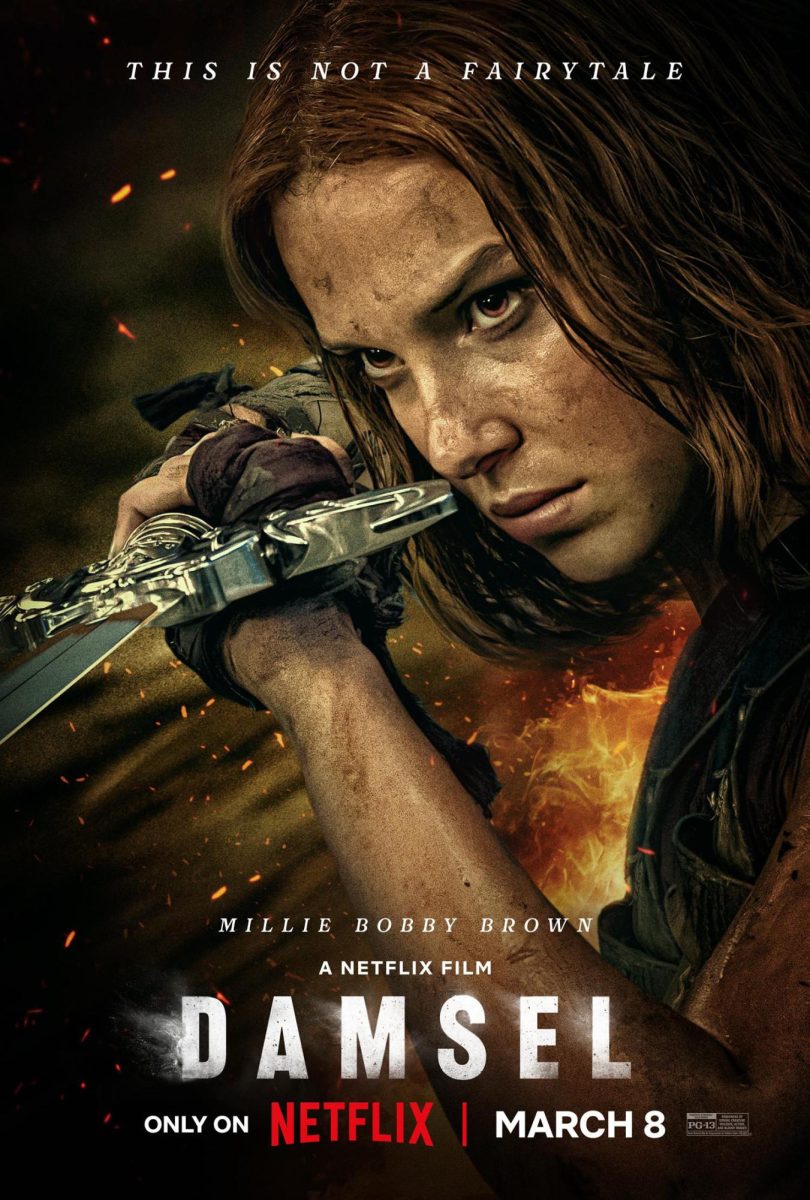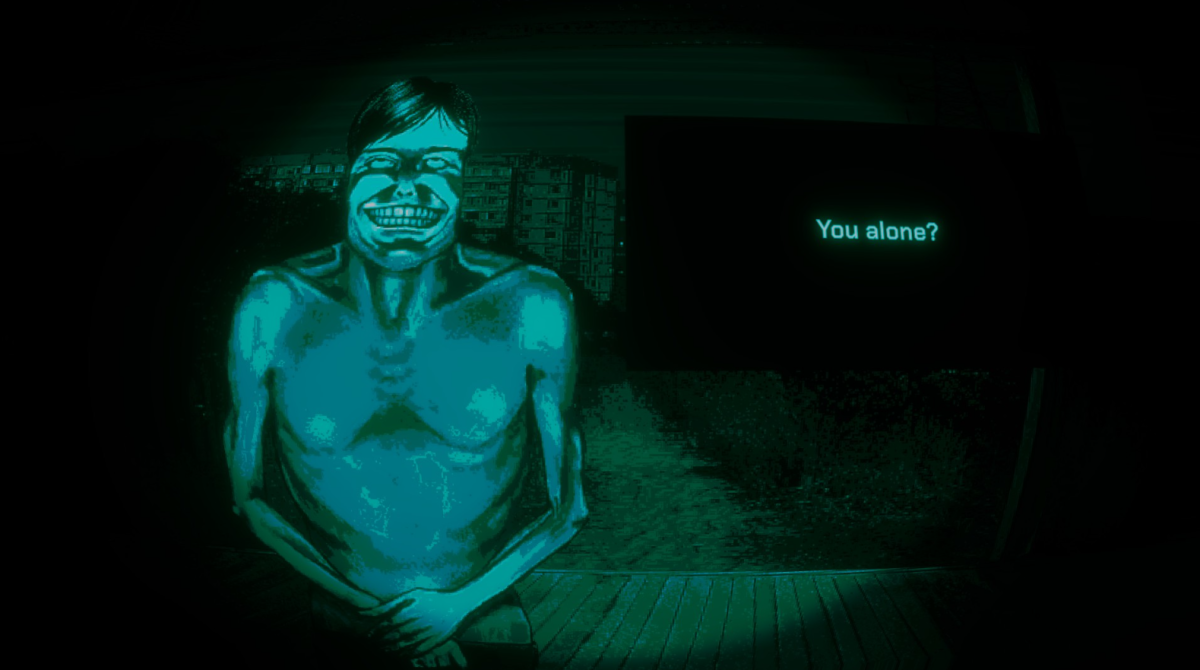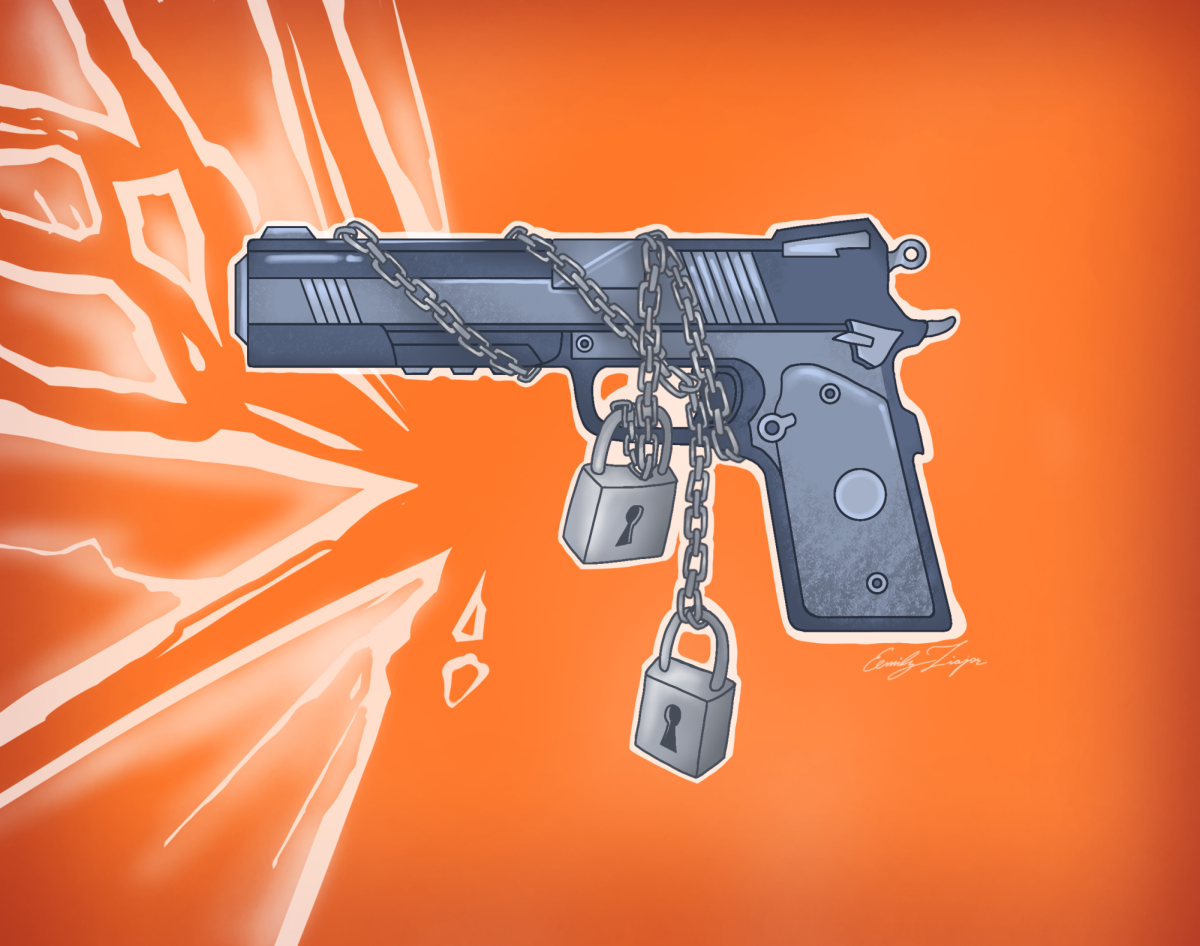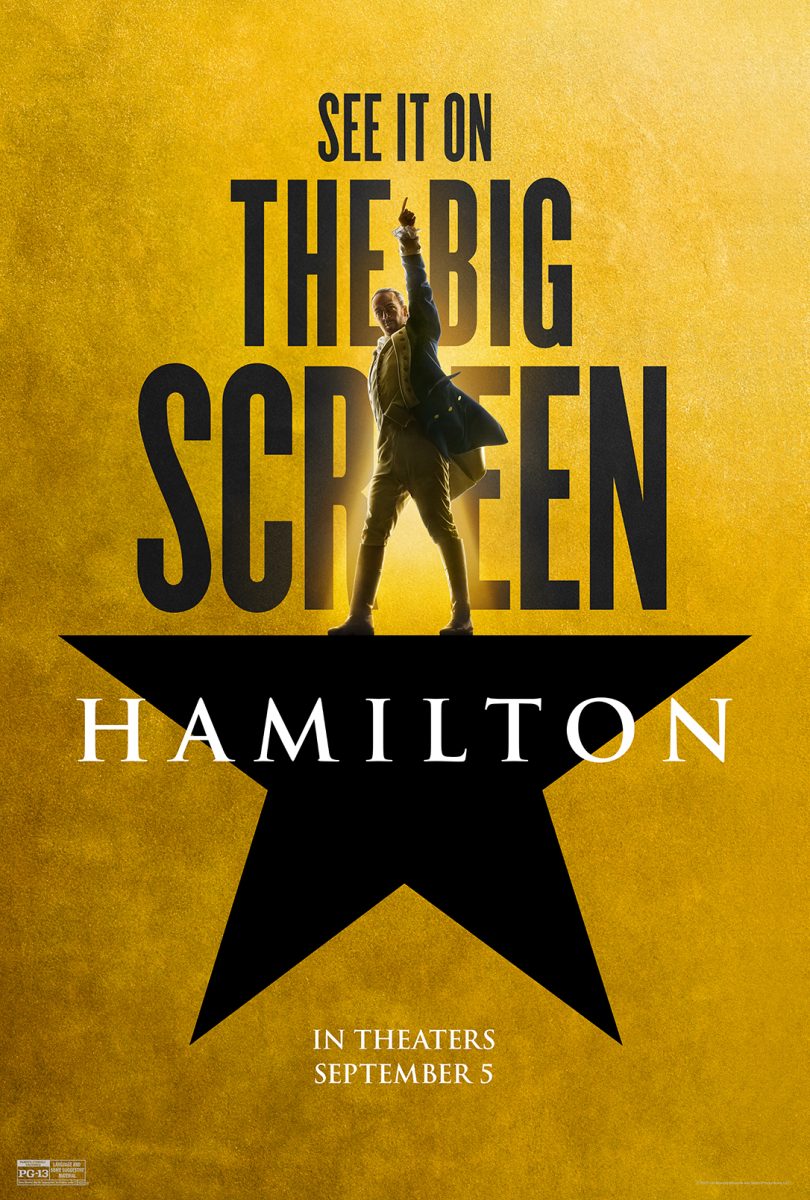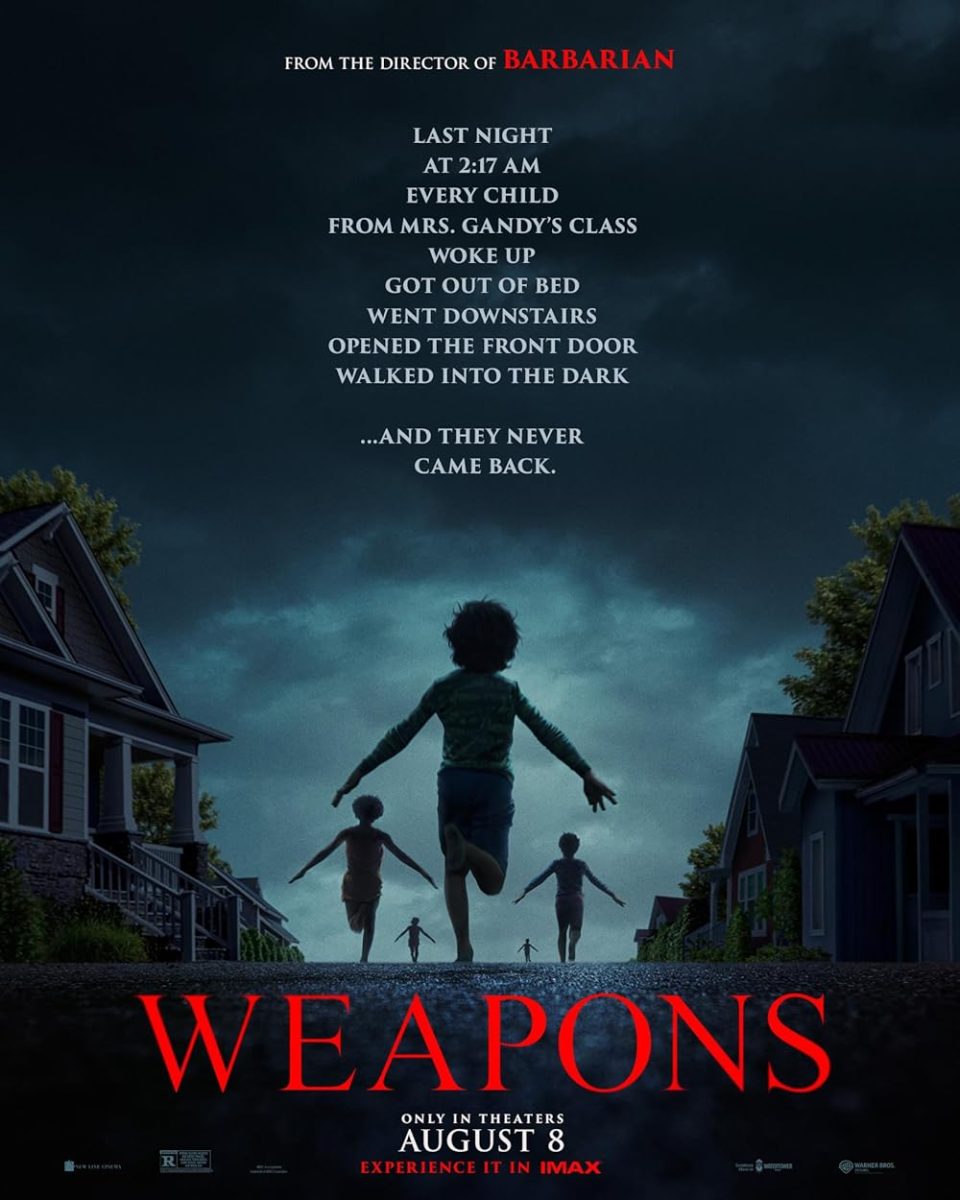If you enjoyed watching Shrek for the plot’s inversion of all the classic fairy tale tropes but were looking for a movie that lacked clever dialogue, original plot, any humor and endearing, fully-fleshed-out characters, then do I have a movie for you!
Netflix’s “Damsel,” released for streaming in March, is not your stereotypical ‘prince saves the damsel in distress’ fairytale. How did I surmise this, outside of looking at the movie poster where the protagonist hefts a sword and stares menacingly into the distance? Elodie, the tale’s ‘damsel,’ tells us that, almost word for word, as the movie opens with her brief narration. This opening is a great representation of the issues that permeate the film; it’s lazy, falsely reliant upon its ‘feminist’ foundation, and makes me question whether the screenwriters skipped the show-don’t-tell unit of ninth-grade English class.
Elodie (played by Millie Bobby Brown in a bad auburn wig) is the dedicated and spirited princess of a destitute kingdom who lives with her younger sister, her stepmother (played by a critically underutilized Angela Bassett) and her kingly father. Concerned by the looming threat of a deadly winter, their prayers seem answered when they receive a request from the unknown kingdom of Aurea for Elodie’s hand in marriage and are promised from the much larger and wealthier kingdom in return.
However, after marrying the prince, Elodie’s tale takes a turn as she learns she was brought to the kingdom to be a bride, but a sacrifice to the dragon inhabiting a nearby mountain instead. A damsel in distress that was betrayed by an unchivalrous prince, Elodie spends the majority of the movie running away from the dragon (who is voiced by the raspy, distinctive tones of the wonderful Shohreh Aghdashloo) and fighting to save herself.
Overall, the film’s worst offense is that it’s lazy. I don’t feel like the writers or producers really cared about the film they were working on or the ‘empowering’ message they were putting out. None of the characters feel real. The dialogue feels contrived, and the film lacks any truly compelling, original elements. I don’t feel endeared by Elodie’s character or care about her struggles because I don’t know more than surface-level details about her character, like that her “dream” is to travel the world, but doesn’t specify where. She comes off a bit irritating in the beginning as well, spending her time self-righteously lecturing her sister about the economic problems their people are facing and struggling to chop wood. I assume this is to demonstrate her dedication to her kingdom, but the exposition-heavy and blunt dialogue comes across as wooden and clunky.
The other actors are not given much to work with either. Prince Henry (played by Nick Robinson of Netflix’s “Love, Simon”) is described as ‘charming’ in the Netflix blurb but has as much personality as a cardboard cut-out. He has very few lines and while Robinson seems to be trying to convey silent yet intense emotional turmoil, he just looks constipated in each scene. The Queen Mother, played by Robin Wright, looks like she would rather be anywhere else. Who could blame her, when she already set the gold standard for the romance inversion trope with The Princess Bride decades ago? Unfortunately, in this film, she is given caricaturishly evil lines like calling Elodie an “insolent creature,” and has no personality outside of her cold-blooded condescension.
Another symptom of this laziness is the amount of plot conveniences that are not explained. For example, Elodie suffers third-degree burns in one scene, but that doesn’t slow her down because she conveniently finds (wait for it) magic slugs that HEAL HER WOUNDS when they attach to her limbs. Why? Is this a magic cave? There’s a dragon, so magic isn’t out of the realm of possibility, but there is no plot explanation given for this. The narrative moves on so quickly that this potentially interesting subplot about a magical cave ecosystem can only be taken as a poorly contrived plot device.
Moreover, Elodie learns that she is the last in a long line of sacrifices, as she finds clues carved into the stone walls, left behind by previous princesses for how to escape. She learns that for centuries, Aurea’s royal family has been finding three random girls from faraway kingdoms to marry into their family every generation, in the place of their own daughters.
This plot point leaves me with so many questions. First, how are they getting three princesses every generation to sacrifice for centuries? I know Dateline and Reddit didn’t exist in the Medieval era, but people still traveled and traded. Gossiping is an ancient pastime, and for a kingdom this large and affluent, it’s strange that no news has spread to other regions about the weird antics that Aurea’s aristocracy was getting up to. Were none of the commoners, who had attended three weddings in quick succession, with brides from places you’ve never heard of, that disappeared immediately at the same time that bonfires were being set in the mountains, suspicious? I admire a population that can keep their heads down and their noses clean, but it seems a little far-fetched that no rumors were spread. And did none of these kingdoms these girls came from ever wonder why they never heard from their daughters again?
I’m a fan of narratives where the ‘damsel’ saves herself. Most Disney Princes annoy me (though Aladdin and Li Shang have my heart), so I’m cool with getting rid of them altogether. But when the plot completely relies on my feminist enjoyment of the romantic inversion trope and the script reads like something my 12-year-old self would have posted on Tumblr, it comes off like hollow pandering.
Speaking of which, who was their intended audience for this movie? It’s too violent and darkly serious to be a kid’s film (the opening scene alone has multiple soldiers being burned alive in a gruesome fashion), but I can’t imagine anyone over the age of 15 being swept away by the tired concept. Perhaps they were banking on fans of “Stranger Things” to watch it out of love for Brown, but loyalty can only go so far when a movie comes across as half-baked and boring as this one.
In the end, this movie is a great example of how to waste a star-stuffed cast, gorgeous sets and plot potential. Watch a recording of “Shrek: the Musical” on YouTube instead.


